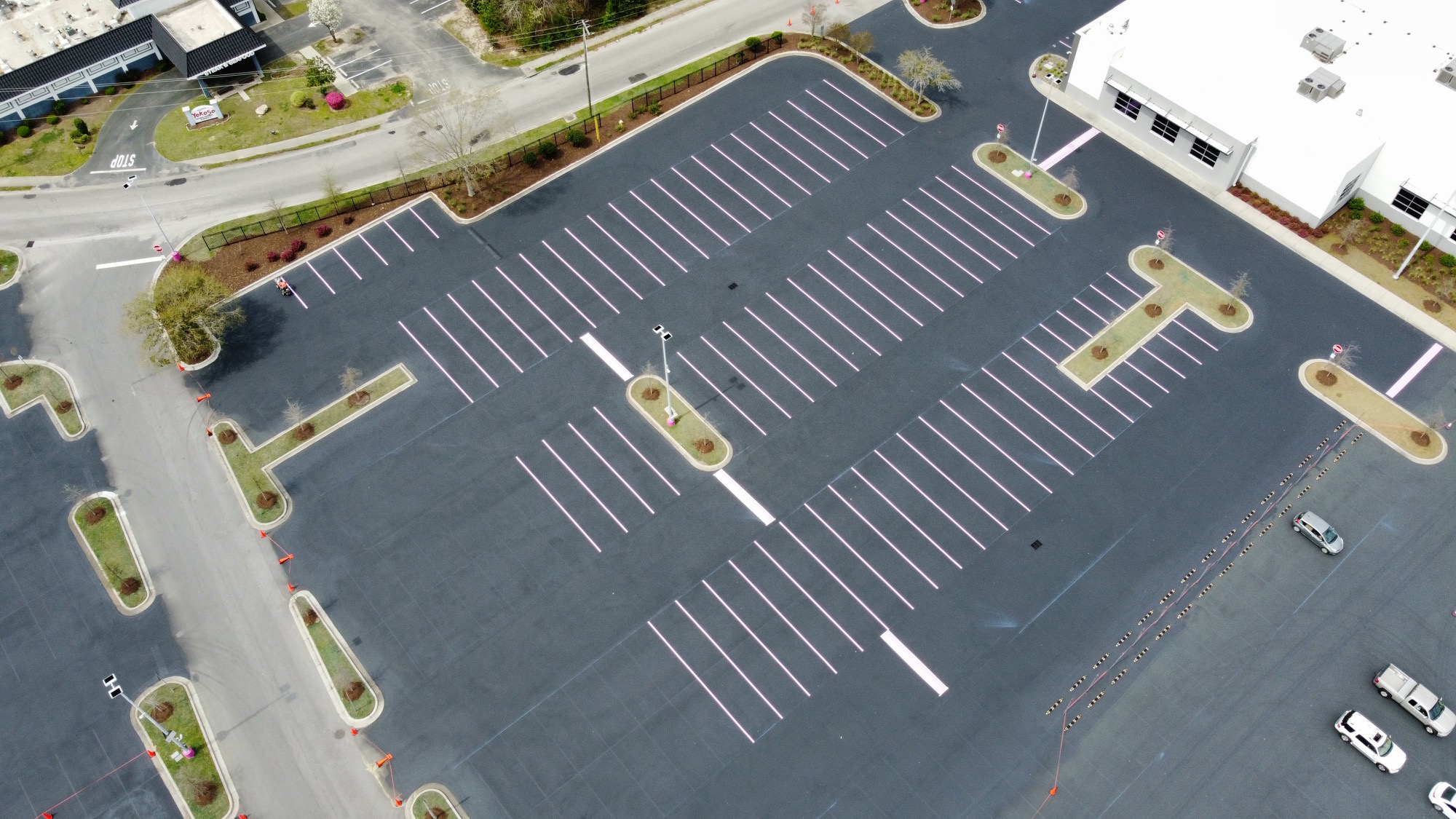 Asphalt pavements are highly popular in the Atlanta metropolitan area as well as other cities in Georgia. Asphalt is an economical paving material that is versatile, rapid to install, and visually appealing, but asphalt pavements do need a little routine maintenance. You may have heard about an asphalt maintenance procedure known as sealcoating. Asphalt sealcoating offers several advantages, but there are a few things about the procedure that some people view as disadvantages.
Asphalt pavements are highly popular in the Atlanta metropolitan area as well as other cities in Georgia. Asphalt is an economical paving material that is versatile, rapid to install, and visually appealing, but asphalt pavements do need a little routine maintenance. You may have heard about an asphalt maintenance procedure known as sealcoating. Asphalt sealcoating offers several advantages, but there are a few things about the procedure that some people view as disadvantages.
What Is Asphalt Sealcoating?
Sealcoating are sealants that are formulated to bond with asphalt paving and create a hard shell over the pavement. Asphalt sealcoating companies typically purchase concentrated sealants from a manufacturer. The manufacturer ships the dry, concentrated sealant to local asphalt sealcoating professionals, and they will add water and sand to the sealant to prepare a liquid mixture. Usually, contractors use sprayers to apply the liquid sealcoating in Atlanta, but they sometimes use squeegees, especially near structures or in tight spaces.
What Are the Benefits of Sealcoating?
Asphalt sealcoating in Atlanta is normally an extremely economical procedure, but it can provide a range of benefits.
1. Sealcoating is a highly effect sunblock. The sun emits UV rays that rob asphalt pavements of their moisture as well as their color. The pavement fades to a dingy shade of gray or brown, and its loss of moisture makes it brittle and much more vulnerable to damage.
2. Asphalt and most vehicle fluids are distilled from petroleum. Petroleum distillates will attempt to reunite when they encounter each other, and the results are normally very destructive. When vehicles leak fluids onto your pavement, sealcoating will slow the rate at which these fluids can reach the asphalt.
3. Atlanta sealcoating also improves the appearance of your pavement. It can rejuvenate your pavement’s color, conceal minor imperfections, and make the surface appear smoother and more even.
4. Sealcoating can enhance the pavement’s traction, especially during wet conditions. Drivers are less likely to experience hydroplaning or tire skidding, and pedestrians are less likely to slip and fall.
5. The services of a reputable sealcoating company can reduce the number of repairs your pavement needs over the course of its life. Any damage should be less severe, which means that it will cost less to repair. Furthermore, routine sealcoating has been shown to extend the life of an asphalt pavement. In some studies, parking lots that received periodic sealcoating lasted more than twice as long as those that never received a sealcoating application.
What Are the Disadvantages of Asphalt Sealcoating?
It is relatively easy to quantify the advantages of Atlanta asphalt sealcoating. However, most sealcoating contractors find it more difficult to pin down the disadvantages. This is primarily due to the fact that what one person might not consider a negative might be a huge problem for someone else. Therefore, whether the following items are true disadvantages will largely depend on your operation and your point of view.
1. Sealcoating is not a one-time treatment. You will need to have your asphalt sealcoating company reapply your sealant every two to three years.
2. Obviously, you will need to keep vehicles off your pavement while your sealcoating company performs the application. However, depending on the weather and other factors, the ban on vehicle traffic could last anywhere from 18 to 48 hours.
3. Your asphalt sealcoating company cannot start work as soon as your paving company leaves. Asphalt paving needs to cure prior to a sealcoating application. In the Atlanta area, sealcoating contractors are often able to seal a new pavement in as little as 10 weeks, but the waiting time could be up to 10 months. During this time, your asphalt pavement will be unprotected, so you should be more diligent about keeping it clean and treating it gently.
4. Asphalt sealcoating contractors should never attempt to seal a pavement with unrepaired damage, including potholes and significant cracks. Since it is applied as a liquid, the sealcoating will drain into the openings without repairing them. The sealant will be wasted, but what is worse is that the cracks will still allow water to infiltrate deep into the structure and inflict costly damage to the foundation.
5. Sealcoating obscures road markings and parking lot line striping, so you will need to repaint them every time you seal your pavement. However, in most cases, pavement paint and sealcoating in Atlanta have virtually identical life expectancies. Furthermore, many asphalt sealcoating companies also offer parking lot striping, crack repairs, and pavement markings. This can save you time and stress.
The Surface Masters can provide you with your asphalt sealcoating, crack sealing, pavement markings, asphalt repairs, concrete curbing, asphalt milling and reclamation, and asphalt paving needs. We serve clients throughout the greater Atlanta region. We have an unblemished reputation for professionalism, dependability, workmanship, and service. To request a free quote on your next project, fill out our online form, call our office in Marietta at 770-250-6392, or send an email to Info@TheSurfaceMasters.com.









